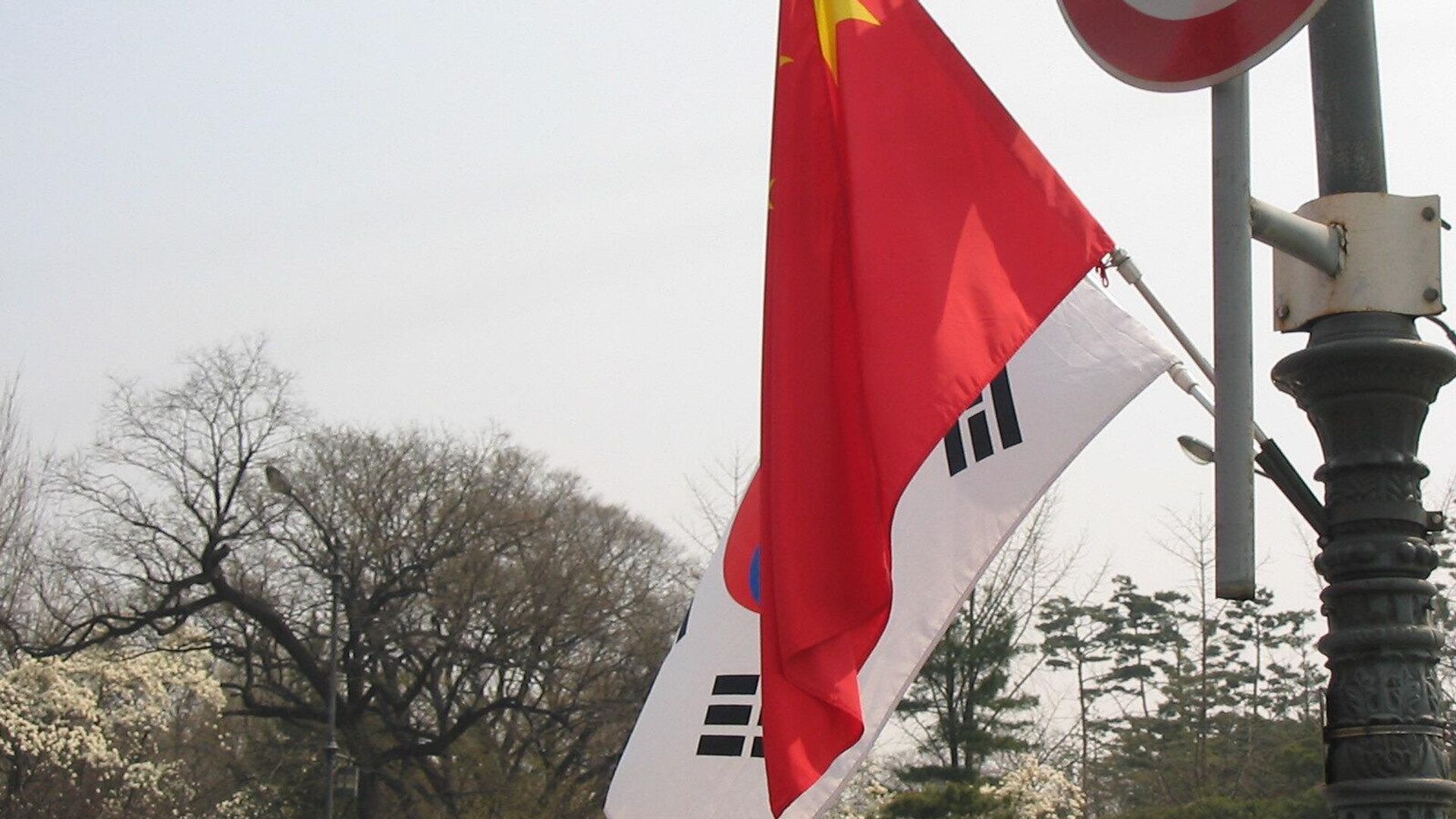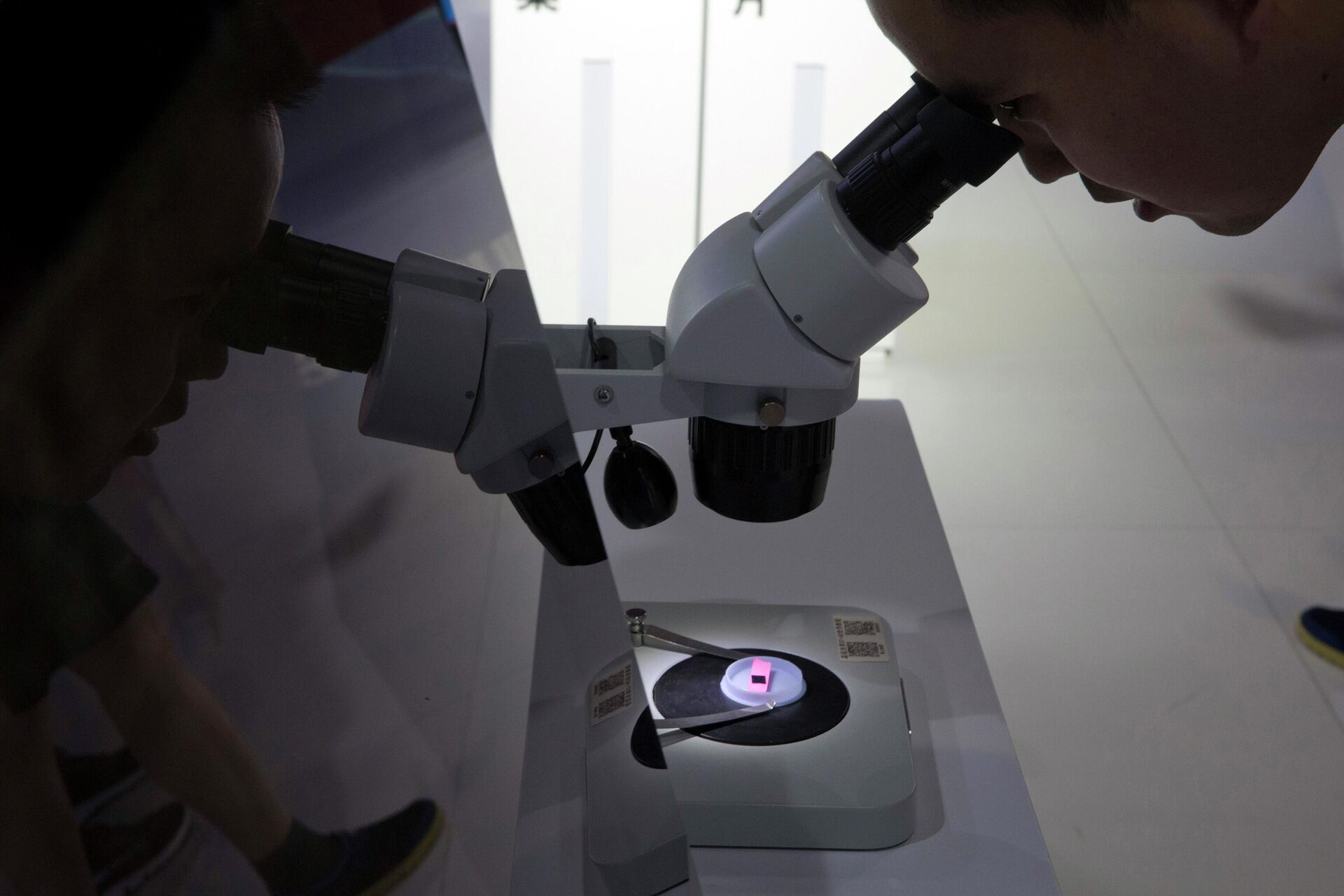https://sputnikglobe.com/20220725/beijing-seeks-to-win-over-seoul-as-us-pushes-anti-china-computer-chip-alliance-1097788713.html
Beijing Seeks to Win Over Seoul as US Pushes Anti-China Computer Chip Alliance
Beijing Seeks to Win Over Seoul as US Pushes Anti-China Computer Chip Alliance
Sputnik International
While US Secretary of State Antony Blinken has said the US no longer seeks to economically “decouple” from China, the intense competition with Beijing the US... 25.07.2022, Sputnik International
2022-07-25T18:22+0000
2022-07-25T18:22+0000
2022-07-25T18:58+0000
china
south korea
semiconductors
chip
alliance
https://cdn1.img.sputnikglobe.com/img/07e6/07/19/1097788566_0:194:1600:1094_1920x0_80_0_0_bc159bab977fa2bfc4d1436fab690eb4.jpg
Xing Haiming, China’s ambassador to Seoul, told South Korea’s Yang Hyang-ja on Monday that the two countries should “exclude external interference” on their cooperation in the semiconductor industry.South Korea is the world’s second-largest maker of semiconductors after the US, producing 18.4% of all semiconductors in 2020, according to Invest Korea. China, on the other hand, is the world’s largest buyer of semiconductors, buying up nearly $30 billion of them last year, including 60% of chips produced in South Korea. China used them to produce 36% of the world’s electronics in 2020, including smartphones, computers, cloud servers, and telecom infrastructure.That’s why Washington’s recent efforts to establish a Chip 4 alliance with South Korea, Japan, and the autonomous Chinese island of Taiwan, is feared by Beijing as an attempt to edge it out of a key value-chain for its economy. The US-directed partnership would seek to realign computer chip production lines among “friendly” nations.“Its actions are undermining international trade rules and splitting the global market. In a highly integrated global economy, what the US has done is against the trend of the times and highly unpopular,” Zhao added. “These moves will eventually end in failure.”Taipei and Tokyo quickly embraced the initiative after it was proposed in March, but Seoul has hesitated, even with the conservative President Yoon Suk-yeol taking office in May. Internal debates continue to rage, even as Washington demands Seoul make a decision by the end of the month.Yang, who met with the Chinese envoy on Monday, put it even more succinctly last week: "When looking at the global industrial landscape, the US is the overwhelming first-class semiconductor powerhouse. If the US is the landlord, Korea, Taiwan, Japan, Europe and China are its tenants," she said in a subcommittee hearing. However, she has maintained that South Korea should enter the alliance, so long as it doesn’t sever its relationship with China.House Speaker Nancy Pelosi (D-CA) was criticized last week after her husband bought as many as $5 million in shares in the California-based chipmaker Nvidia, one of the companies that would receive government money to expand its operations if the CHIPS Act is passed. She told a reporter on Thursday she had “absolutely not” given him insider information to help him make that decision.
china
south korea
Sputnik International
feedback@sputniknews.com
+74956456601
MIA „Rossiya Segodnya“
2022
Sputnik International
feedback@sputniknews.com
+74956456601
MIA „Rossiya Segodnya“
News
en_EN
Sputnik International
feedback@sputniknews.com
+74956456601
MIA „Rossiya Segodnya“
Sputnik International
feedback@sputniknews.com
+74956456601
MIA „Rossiya Segodnya“
china, south korea, semiconductors, chip, alliance
china, south korea, semiconductors, chip, alliance
Beijing Seeks to Win Over Seoul as US Pushes Anti-China Computer Chip Alliance
18:22 GMT 25.07.2022 (Updated: 18:58 GMT 25.07.2022) While US Secretary of State Antony Blinken has said the US no longer seeks to economically “decouple” from China, the intense competition with Beijing the US has embraced has nonetheless led it to increasingly ban or circumvent Chinese products for US companies.
Xing Haiming, China’s ambassador to Seoul, told South Korea’s Yang Hyang-ja on Monday that the two countries should “exclude external interference” on their cooperation in the semiconductor industry.
“China is willing to work with the ROK [Republic of Korea] to adhere to the principle of a fair and just market, eliminate external interference, strengthen cooperation in semiconductor and other fields, and jointly maintain the stability of the global industrial chain and supply chain,” the Chinese envoy told Yang, a former Samsung executive who now serves in the South Korean National Assembly's Semiconductor Industry Special Committee, according to a WeChat post by the Chinese embassy in Seoul.
South Korea is the world’s second-largest maker of semiconductors after the US, producing 18.4% of all semiconductors in 2020,
according to Invest Korea. China, on the other hand, is the world’s largest buyer of semiconductors,
buying up nearly $30 billion of them last year, including 60% of chips produced in South Korea. China used them to
produce 36% of the world’s electronics in 2020, including smartphones, computers, cloud servers, and telecom infrastructure.
That’s why Washington’s recent efforts to establish a Chip 4 alliance with South Korea, Japan, and the autonomous Chinese island of Taiwan, is feared by Beijing as an attempt to edge it out of a key value-chain for its economy. The US-directed partnership would seek to realign computer chip production lines among “friendly” nations.
“The US always claims itself to be a champion of free trade, but has time and again abused its state power to politicize, instrumentalize and weaponize sci-tech and business issues, engaged in ‘coercive diplomacy’ and sought to forcibly relocate industries and push for decoupling,” Chinese Foreign Ministry spokesperson Zhao Lijian told reporters last week, when asked about the Chip 4 alliance.
“Its actions are undermining international trade rules and splitting the global market. In a highly integrated global economy, what the US has done is against the trend of the times and highly unpopular,” Zhao added. “These moves will eventually end in failure.”
Taipei and Tokyo quickly embraced the initiative after it was proposed in March, but Seoul has hesitated, even with the conservative President Yoon Suk-yeol taking office in May. Internal debates continue to rage, even as Washington demands Seoul make a decision by the end of the month.
Science Minister Lee Jong-ho warned recently that while “Fab 4,” as it’s been nicknamed in Seoul, “is restricted to the semiconductor sector, it can have an impact on other industries. So we have to be cautious.”
Yang, who met with the Chinese envoy on Monday, put it even more succinctly last week: "When looking at the global industrial landscape, the US is the overwhelming first-class semiconductor powerhouse. If the US is the landlord, Korea, Taiwan, Japan, Europe and China are its tenants,"
she said in a subcommittee hearing. However, she has maintained that South Korea should enter the alliance, so long as it doesn’t sever its relationship with China.
Washington’s concern isn’t just edging out China, though: it’s also buttressing its own semiconductor supply amid a severe shortage created by the COVID-19 pandemic. The US Senate is poised to vote on a $52 billion subsidy for domestic semiconductor producers, the CHIPS Act, before the week is out. The House already passed the bill in February.
House Speaker Nancy Pelosi (D-CA) was criticized last week after her husband bought
as many as $5 million in shares in the California-based chipmaker Nvidia, one of the companies that would receive government money to expand its operations if the CHIPS Act is passed. She
told a reporter on Thursday she had “absolutely not” given him insider information to help him make that decision.


